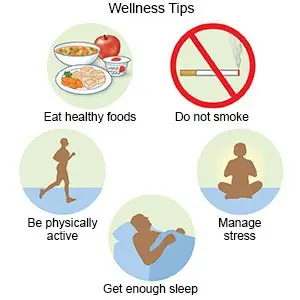What do I need to know about anxiety?
Anxiety is a condition that causes you to feel extremely worried or nervous. The feelings are so strong that they can cause problems with your daily activities or sleep. Anxiety may be triggered by something you fear, or it may happen without a cause. Family or work stress, smoking, caffeine, and alcohol can increase your risk for anxiety. Certain medicines or health conditions can also increase your risk. Anxiety can become a long-term condition if it is not managed or treated.
What are the signs and symptoms of anxiety?
- Fatigue or muscle tightness
- Shaking, restlessness, or irritability
- Problems focusing
- Trouble sleeping
- Feeling jumpy, easily startled, or dizzy
- Rapid heartbeat or shortness of breath
How is anxiety diagnosed?
Tell your healthcare provider when your symptoms began and what triggers them. Tell your provider if anxiety affects your daily activities. Your provider will also ask about your medical history and if you have family members with a similar condition. Tell your provider about your past and current alcohol, nicotine, or drug use. Any of these may worsen anxiety.
How is anxiety treated?
Treatment depends on how severe your symptoms are. The following are common treatments for anxiety:
- Cognitive behavioral therapy (CBT) teaches you how to identify and change negative thought patterns.
- Anxiety or antidepressant medicine may help relieve or prevent anxiety. You may need to take the medicine for several weeks before you begin to feel better. Tell your healthcare provider about any side effects or problems you have with your medicine. The type or amount of medicine may need to be changed. Medicines are usually used along with therapy.
Treatment options
The following list of medications are in some way related to or used in the treatment of this condition.
- Xanax
- Ativan
- Lexapro
- BuSpar
- clonazepam
View more treatment options
What can I do to manage anxiety?
- Talk to someone about your anxiety. Your healthcare provider may suggest counseling. You might feel more comfortable talking with a friend or family member about your anxiety. Choose someone you know will be supportive and encouraging.
- Get regular physical activity. Physical activity can lower your stress, improve your mood, and help you sleep better. Work with your healthcare provider to develop a plan that you enjoy.

- Create a regular sleep schedule. A routine can help you relax before bed. Listen to music, read, or do yoga. Try to go to bed and wake up at the same time every day. Sleep is important for emotional health.
- Do activities you enjoy. Spend time with friends, or do something fun. Choose activities you are familiar with or comfortable doing. This may help prevent anxiety.
- Practice deep breathing. Deep breathing can help you relax when you feel anxious. Focus on taking slow, deep breaths several times a day, or during an anxiety attack. Breathe in through your nose and out through your mouth. Deep breathing combined with meditation or listening to music may help you feel calmer.
- Do not smoke. Nicotine and other chemicals in cigarettes and cigars can increase anxiety. Ask your healthcare provider for information if you currently smoke and need help to quit. E-cigarettes or smokeless tobacco still contain nicotine. Talk to your healthcare provider before you use these products.
- Do not have caffeine. Caffeine can make your symptoms worse. Do not have foods or drinks that are meant to increase your energy level.
- Do not drink alcohol or use drugs. Alcohol and drugs can worsen anxiety or make it hard to manage. Talk to your therapist or healthcare provider if you need help to quit.
 |
The following resources are available at any time to help you, if needed:
- Contact a suicide prevention organization:
- For the 988 Suicide and Crisis Lifeline:
- Call or text 988
- Send a chat on https://988lifeline.org/chat
- Call 1-800-273-8255 (1-800-273-TALK)
- For the Suicide Hotline, call 1-800-784-2433 (1-800-SUICIDE)
- For the 988 Suicide and Crisis Lifeline:
- For a list of international numbers: https://save.org/find-help/international-resources/
Where can I find more information or support?
- National Alliance on Mental Illness
3803 N. Fairfax Dr., Suite 100
Arlington , VA 22203
Phone: 1- 703 - 524-7600
Phone: 1- 800 - 950-6264
Web Address: http://www.nami.org
- 988 Suicide and Crisis Lifeline
PO Box 2345
Rockville , MD 20847-2345
Phone: 1- 800 - 988
Web Address: http://www.suicidepreventionlifeline.org OR https://988lifeline.org/chat/
Call your local emergency number (911 in the US) if:
- You have chest pain, tightness, or heaviness that may spread to your shoulders, arms, jaw, neck, or back.
- You think about harming yourself or someone else.
When should I call my doctor?
- Your symptoms get worse or do not get better with treatment.
- Your anxiety keeps you from doing your regular daily activities.
- You have new symptoms since your last visit.
- You have questions or concerns about your condition or care.
Care Agreement
You have the right to help plan your care. Learn about your health condition and how it may be treated. Discuss treatment options with your healthcare providers to decide what care you want to receive. You always have the right to refuse treatment. The above information is an educational aid only. It is not intended as medical advice for individual conditions or treatments. Talk to your doctor, nurse or pharmacist before following any medical regimen to see if it is safe and effective for you.© Copyright Merative 2023 Information is for End User's use only and may not be sold, redistributed or otherwise used for commercial purposes.




